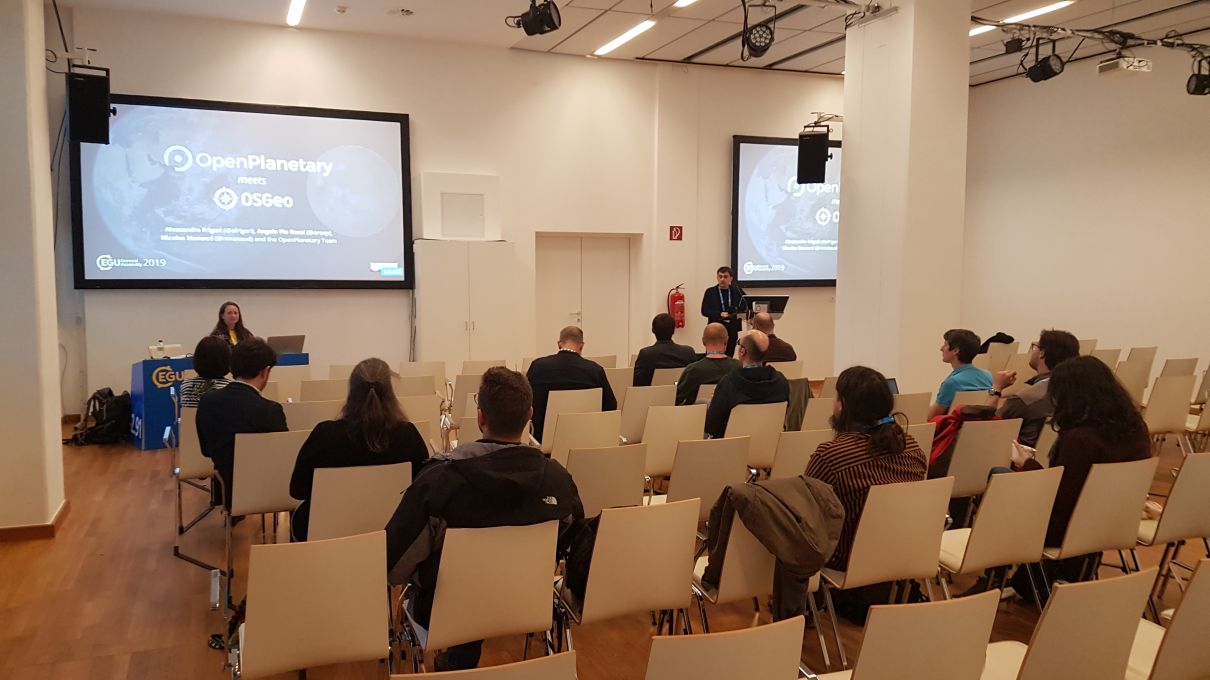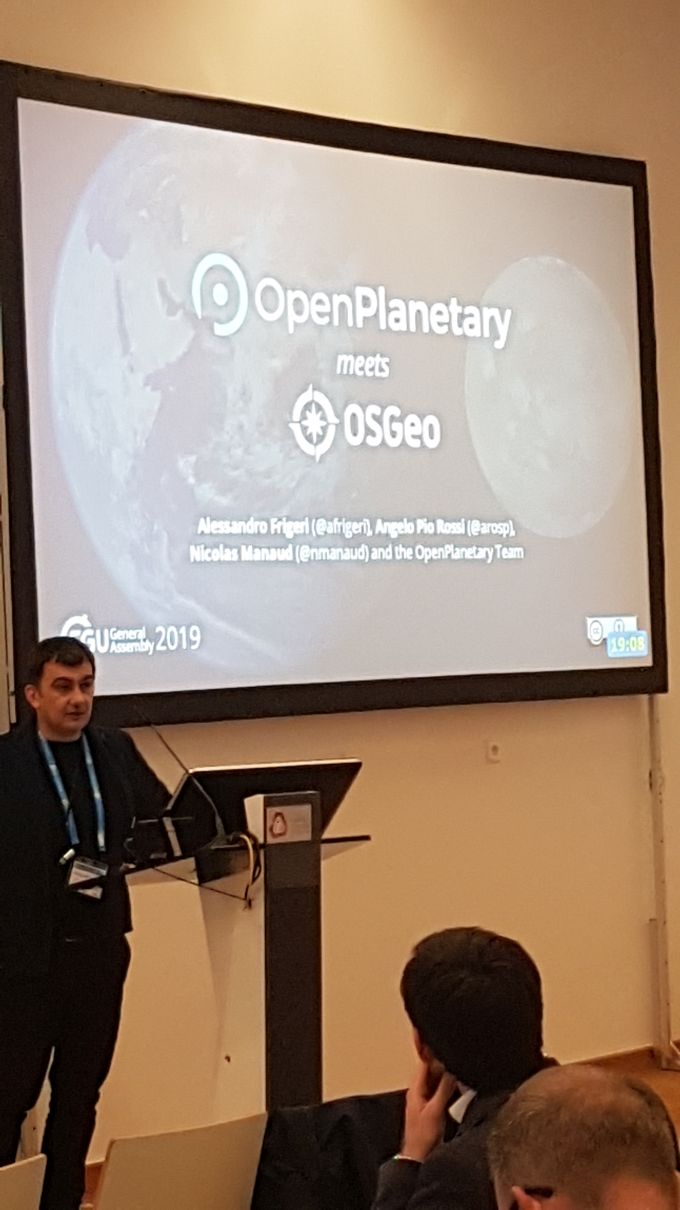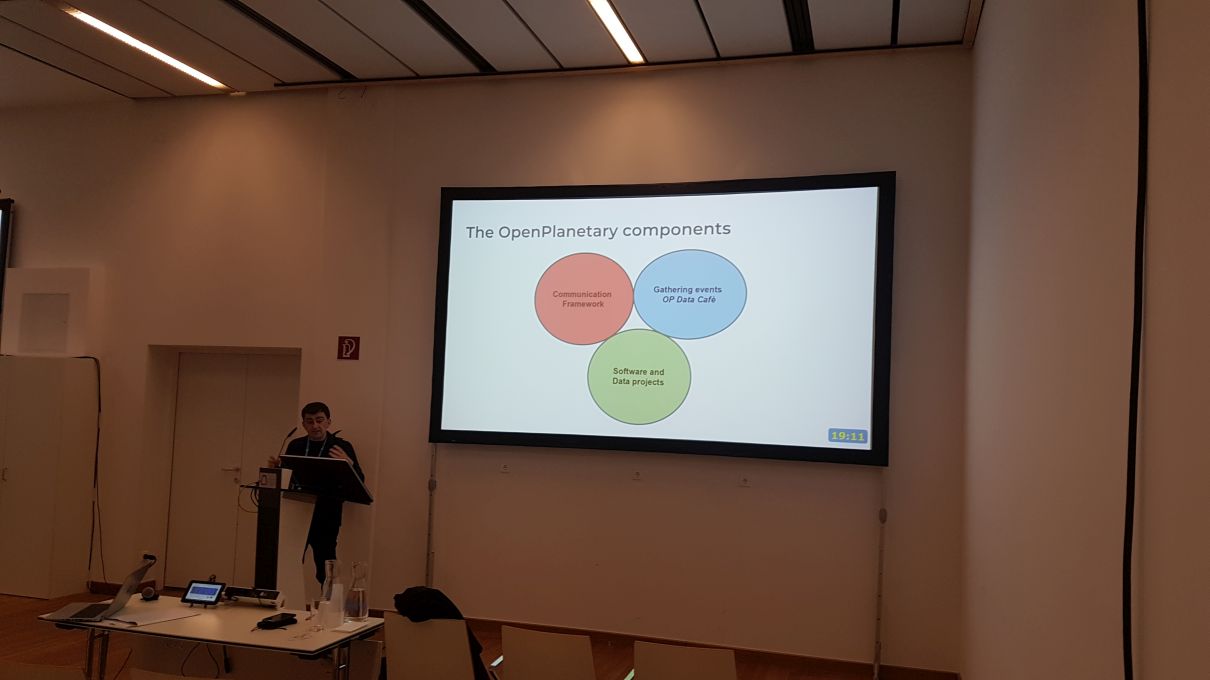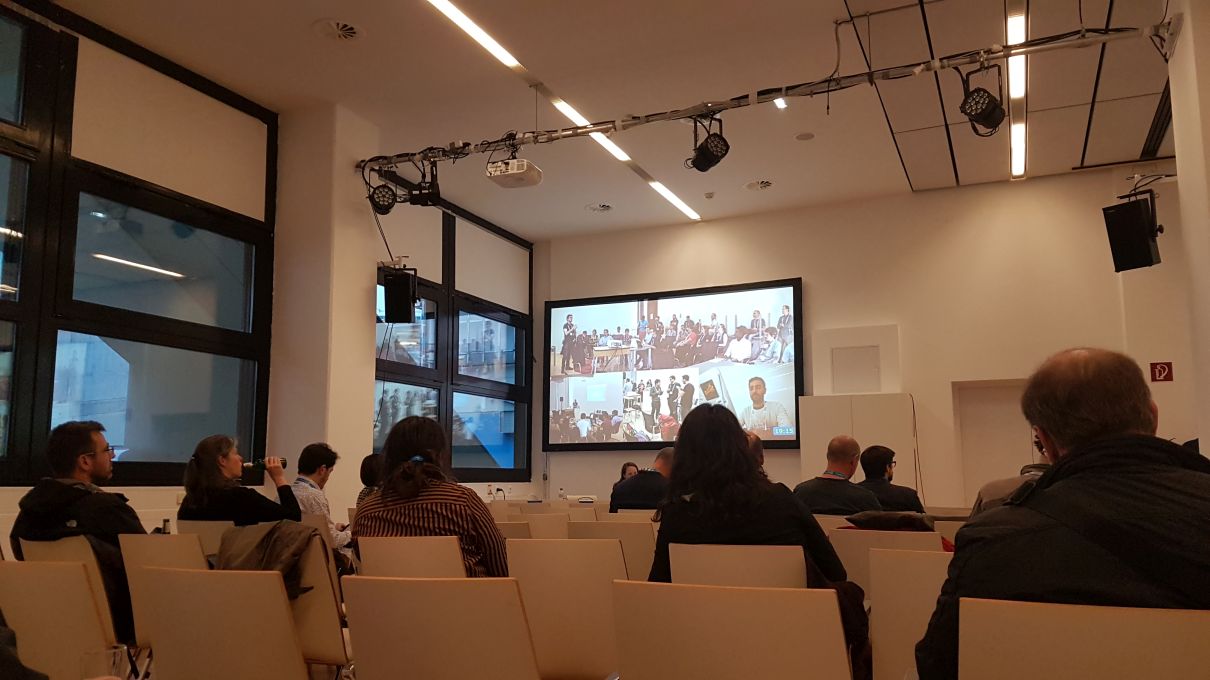Difference between revisions of "EGU Townhall 2019"
(Added Ales presentation) |
|||
| Line 193: | Line 193: | ||
===== Presentation slides ===== | ===== Presentation slides ===== | ||
| − | File: | + | File:OpenPlanetaryPresentation(forEGU2019)_small.pdf |
===== Pictures ===== | ===== Pictures ===== | ||
Revision as of 04:44, 24 February 2022
Ramp Up
General Information
Title of the event
OSGeo Townhall: Joint OSGeo / Open Planetary Data TH
Abstract
TM8: Joint OSGeo / OpenPlanetary Townhall on Open Science Convener: Peter Löwe Co-convener: Alessandro Frigeri
The paradigm of Open Science is based on the tiers Open Access, Open Data and Free Open Source Software (FOSS). However, the interconnections between the tiers remain to be improved. This is a critical factor to enable Open Science. This Townhall meeting reaches out all across EGU, espescially welcoming Early Career Scientists, to network and discuss the current challenges and opportunities, including:
OpenPlanetary (OP) was born as a community-driven initiative to address the need of the planetary science community for sharing ideas and collaborating on common planetary research topics mostly related to data analysis problems. OpenPlanetary started back in 2015 from an initial participants effort to stay connected and share information related to and beyond the ESA’s first Planetary GIS Workshop. It then continued during the 2nd USGS Planetary Data Workshop. Since 2018 OP became a non-profit organization.
With 300+ members across many countries, the OpenPlanetary community is made-up of and intended for research and education professionals: scientists, engineers, designers, teachers, and students, as well as space enthusiasts and citizen scientists.
Our common goal is to promote and facilitate the open practice of planetary science and data analysis for professionals and amateurs. We do so by organizing events and conducting collaborative projects aimed at creating scientific, technical and educational resources, tools and data accessible to all. For two years OP has organized the OP-DataCafe within the European Planetary Science Congress, where researchers gather to discuss data and software related topics.
The OP flagship project is OpenPlanetaryMap (OPM), a mapping and social platform to foster planetary mapping and cartography on the web for all.
Since a big part of planetary data comes from the processing of remote sensing instruments, the use of geospatial technologies commonly used for Earth-based application is being spread among the Planetary Science community in the last decade.
This OSGeo/OPM townhall meeting represents the first contact between the newborn OP and the more than 10 years old OSGeo foundation. We will discuss and delineate possible common ground where to develop ideas and coordinates projects.
The Open Source Geospatial Foundation, or OSGeo, is a not-for-profit umbrella organization for Free and Open Source geospatial tools, including QGIS, gvSIG, GRASS GIS, Geoserver and many others. OSGeo is hosting this Townhall event to support the collaborative development of open source geospatial software by promoting sustainable Open Science within EGU.
Organizing team (Draft) [add your name!]
Peter Löwe, Alessandro Frigeri, yournamehere
Primary points of contact
at Copernicus (conference organizer): Katja Gänger (egu2018 AT copernicus DOT org)
for Copernicus: peter.loewe AT gmx DOT de
URL
Overview over all EGU Townhalls
Onlie descriptions of all EGU 2019 Splinter and Townhall Meetings
Venue / Time (requested)
Requested day: Thu, 11 Apr, 19:00–20:00
Time: 19:00-20:00
Room: Room -2.91
Estimated number of attendees: 75–99 (optimistic assumption) - pragmatic guestimate for catering, etc: 50 pax
Type of event
Townhalls are "networking events" hosted at the European Geosiences Union (EGU) General Assembly (GA) for up to 350 people.
EGU-wording: "Townhall Meetings are meetings open for all participants in the conference at which new initiatives or decisions are announced to a larger audience following an open discussion on the matter raised."
Townhalls are hosted in the evening following the conclusion of all scientific tracks. The events last one hour and usually have presentations / announcements taking up the first 20 minutes, to allow for an open discussion among the attendees. During this phase, refreshments are provided to ensure a lively and convivial atmosphere.
Expected Audience Size
50 - 80 people (optimistic guestimate from 2017 attendance numbers, we got less in 2018 dur to competing events)
Audience: Topical Background
Free Open Source Software from OSGeo projects affects most if not all EGU Divisions. Currently FOSS (OSGeo projects + R, GMT, etc.) is particularly strong in the Hydrology, Atmospheric Sciences, Earth and Space Sience Informatics and Tectonics Divisions.
Attendees are expected from the following fields (Academia, Research and Industry).
- Atmospheric Sciences
- Biogeosciences
- Climate: Past, Present & Future
- Cryospheric Sciences
- Earth Magnetism & Rock Physics
- Energy, Resources and the Environment
- Earth and Space Science Informatics
- Geodesy
- Geodynamics
- Geosciences Instrumentation and Data Systems
- Geomorphology
- Geochemistry, Mineralogy, Petrology & Volcanology
- Hydrological Sciences
- Natural Hazards
- Nonlinear Processes in Geosciences
- Ocean Sciences
- Planetary and Solar System Sciences
- Seismology
- Stratigraphy, Sedimentology and Palaeontology
- Soil System Sciences
- Solar-Terrestrial Sciences
- Tectonics and Structural Geology
Audience: Professional Level
- Doctorate Students, PostDocs, Researchers, Activists, Leaders, Visionaries, Decision Makers, Funding Agencies
Venue
- EGU GA location at the Vienna International Conference Centre, Austria
- Townhall location: The townhall will be hosted in a dedicated lecture hall on the conference premises. Room capacity: Most likely up to 100 people.
- Date and time: Thu, 11 Apr, 19:00–20:00
- Room: Room -2.91
Relevance for OSGeo (Draft)
how will our participation help OSGeo
- Continuation and expansion of the "topical bridgehead" established within EGU by the first two OSGeo Townhalls in 2014 and 2015.
- Raise awareness at and reach-out to the European geoscience community by hosting a dedicated public OSGeo event at the largest European geoscience conference.
- Reach out to young scientists starting their careers.
- Meeting place for people already active in OSGeo ("meta-BoF") as a large number of people congregates every year at the EGU GA.
- Reach out to decision makers/elders/scientific activists within the EGU Divisions.
- Culmination of the "FOSS day" at the EGU GA: The organizers are urged to to schedule all FOSS / OSGeo - related events on the same day. This will ensure we have a large audience and niceties such as "FOSS flashmobs" can be arranged for poster sessions. The "FOSS day" could and should be finished off with the OSGeo townhall, as a "multiplier/bring them all together" event.
- Peaceful und friendly coexistence: Propiertary platforms including Microsoft, Google and ESRI are also staging dedicated events during EGU GA.
- Awareness on the decision maker level: Significance of OSGeo within the emerging Data Science / Open Science debate ("-> OSGeo-tailored research programmes ?")
Budget
- Venue rental cost: none
- Catering cost: 2000 EUR / 2278 USD [Learned/Report for 2015] [required]
- Promotional material: 250 EUR / 285 USD (Posters/flyers announcing the event) [required] -> Lessons Learned from 2016 !
- Budget will be allocated within OpenGeoScience Committee budget as part of Open_Geoscience_Committee/budget_2019
- Costs: The total catering costs were 959,93 EUR (bill by Motto Catering, April 24 2019), which were paid via the OSGeo credit card (-> Treasurer/Mike).
Total requested amount from the upcoming OpenGeoScience budget: 2563 USD
Proposed Payment Method
- No seed money required
- All catering expenses (ca. 2000 USD) can be charged on the OSGeo Credit Card (as since 2014) before and after the event.
Support by OSGeo
- Finacial support
- Use of Logos
- Volunteers: Preparation phase, event hosting, presentations during the event (-> OpenGeoScience Committee).
Preparation
Timeline
Official EGU 2019 timeline and milestones
- 2018-11: Open Geoscience Committee agrees to do a joint Townhall (suggestion by Ale Frigeri)
- 2018-12-22: Townhall has been requested from Copernicus by PL.
- 2019-01-01: Townhall has been accepted
- 2019-01-10: Update of Townhall abstract by Alessandro Friegeri (-> OpenPlenary).
- 2018-late-January: Open Geoscience Committee budget 2019 (with Townhall budge factored in) requested
- Three weeks before event: Caterer was asked for a quotation for 50 pax
- 10 days before the event: Caterer was asked to reduce quotation for 30 pax
- 9 days before event (a bit late): OSGeo treasurer Mike was contacted to authorize credit card access
- 3 days before event: Flyers / Pointers produced
- 2 days before event: Slidesets (OSGeo / OpenPlanetary) ready, speakers confirmed
- 8 hours before event: Flyers distributed / personal invites to interested parties
- 1 hour before event: Pointer-signs placed on walls, room inspection, etc.
- ESSI
- Early Career Scientists
- Data Helpdesk
- Planetary and Solar System Science
- Solar-Terrestrial Science
- Hydrology ?
- Tectonics ?
- Workshops ?
- Great Debates ?
Reach Out
Reach out to DLR, NASA, ESA, etc.
Points of contact:
- PL: AGU Planetary Sciences Section: Rosaly Lopes, AGU Section President, Planetary Sciences
- PL: ?? DLR Institute for planetary science (https://www.dlr.de/pf/desktopdefault.aspx/tabid-7640/)
- PL: ?? FU Berlin ?? https://www.geo.fu-berlin.de/geol/fachrichtungen/planet/staff_rd/index.html
- PL: EGU division on PLANETARY AND SOLAR SYSTEM SCIENCES
- PL: EGU ESSI division
Mailing lists:
AGU Planetary Sciences Section Newsletter
EGU Announcement Poster / Flyer
TBD
Meeting with local OSGeo/OSM chapter and activists
TBD
Presentation slides
File:OpenPlanetaryPresentation(forEGU2019)_small.pdf
Pictures
Budget
20170117: 2250 EUR have been requested as part of the Open GeoScience Committee budget 2019.
Last years Lessons Learned
- Avoid conflicts with Medal Lectures ! This year, the TH coincides with the ESSI Medal Lecture for Kerstin Lehnert. ESSI medal 2018
- Sync timeslots with Research Software Engineer TH.
- Avoid time conflicts with ECS great debates !
- Plan for a meeting with the austrian OSGeo community ahead in time (4-6 weeks).
- Paper-based information material is becoming deprecated for reach out before the TH.
- Personally handed over printed invitations (business card size or slightly larger) still do work.
- A "swag-store" for OSGeo-Stickers and badgets works well AT the TH
- Bring a large banner to be hung in front of the room
- EGU doesn't do MoU like AGU.
- EGU has already a large number of medals, like the [[1]ESSI medal] which is already sponsored by ESRI - they will currently NOT yet another medal by OSGeo.
- Advertise well ahead on social media (LinkedIn, Facebook, etc.), via OSGeo mailing lists, OSGeo webpage (news item) and related communities, like RDA, FORCE11, codemeta, etc.
Opportunities for 2019
- The ESSI division is changing its overall approach. OSGeo should play a prominent role in the discussions.
- OSGeo could sponsor a dedicated session in ESSI or cross-division.
- OSGeo could sponsor a price / (lunch-)event /session for early career scientists
- EGU intends to introduce a "data helpdesk" in 2019 or later, similar to the one introduced by AGU in 2017: OSGeo folks could participate by giving advice on particular software tools ("Ask a guru") - this would provide much more flexibility than normal EGU workshops, since it would be driven by real world questions of the attendees.
Execution
- Presentation by Peter Löwe [todo: upload & link]
- Presentation by Alessandro Frigeri [todo: upload & link]
Outcome
- 20 persons attended and left their email-adresses (Nations: Great Britain, Netherlands,Austria, Czechia, Germany, Italy, Switzerland, Denmark, Namibia)
- Catering was downsized for 30 pax, still plenty
- A quick show of hands received equal votes for keeping it as an evenin event, a lunch event, or undecied.
Lessons learned
- This year four "open themed" THs were held in parallel. This is really an issue. While it's good to see that "open" THs have picked up, the scheduling forces an unnecessariy XOR priorisation by the attendees. Need to talk to EGU/Copernicus about this (todo: PL).
- Paper-based hand outs/invites do still work, but because of the sheer number of attendees and the size of the value this does not carry far.
- Preemptive email-announces on mailing lists and twitter(?) seem to be much more effective.
- Make the presentations colorful & impressive.
- "Pointer signs" help to shuffle the attendees in the right room.
- TODO: Archive templates for Pointer Signs, Presentaions, and which mailing lists to be used in 2020.
- Sync with Research Software Engineers and other "open" THs well before EGU 2020.
- Do NOT order platters of food at Esterhazykeller for post-event get-togethers: It's way too much food and not cheap (bill was not charged on OSGeo, of course).
- Flag the event explicitly as "ECS-friendly" in the EGU-CMS.
- Do reach out to the ESRI booth staff
- Avoid timeslot collisions with:
- Early career scientist events
- Anything hosted by Kerstin Lehnert, Peter Fox,Lesley Weybourne, Jens Klump or Kirsten (GFZ)
- ESSI medal lectures
- Other "open/FAIR"-themed THs
- Research Software Engineer THs
- Advertise the event at earlier ESSI sessions that day, including the ESSI Division meeting
- Advertise ahead of EGU on the ESSI blog.
- TH events at AGU GA are not necessarily as prohibitively costly as expected: Events at a hotel suite with alcoholic beverages ARE excessively expensive, but the AGU POCs (Shelley/Brooks) should be able (if contacted early) to help to get a room for a gathering.
- The ESSI medal is financially supported by ESRI, which receives due recognition and mentioning at the annual division meeting. Since EGU has is discouraging ideas for new medals, OSGeo could consider new ways to provide some funding support for the division to get public recognition: A price for ECS doing innovative software ?



